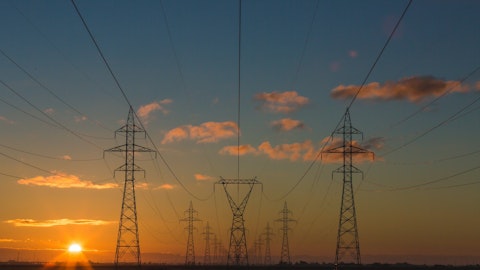Michael Sullivan: Okay, great. Then just last one from me, can you maybe just give us a sense of where things are at and where you expect them to go in terms of some of the bills pending at the Kansas legislature, looking at things like appointed commissions and such?
David Campbell: Sure, so there are multiple bills in flight in Kansas, pretty active session with respect to utility bills. The one that was passed out of committee but has been–well, I don’t want to get into too much process detail, so the expectation–you know, our expectation is that there will be robust discussion around potential election of commissioners, we don’t think that makes sense as a policy approach, and that probably has less broad support so we don’t think that that’s going to advance, but there will continue to be good discussion around that. There have been bills advanced relating to right of first refusal for a transmission project which we think could really benefit customers in terms of predictability, regulatory oversight, and consistency of approach and process.
There is a bill that has been advanced related to our transmission delivery charge that is subject to ongoing discussion. It was passed out of committee but it was–the process term is called blessed by the speaker, so it has not been voted on by the full house since–in discussions around that, and if it does end up going to the full house, then of course it’d go over to the senate. I think there will be ongoing discussions in Kansas, unclear if something will ultimately pass this year, but we’re working closely with stakeholders and we think those discussions are going constructively.
Michael Sullivan: Great, thanks for all the color.
David Campbell: You bet, thank you Michael.
Operator: Thank you. Our next question comes from the line of Shahriar Pourreza of Guggenheim. Please go ahead, Shahriar.
Shahriar Pourreza: Hey, good morning guys.
David Campbell: Morning Shahriar.
Shahriar Pourreza: Just on the cases in Kansas, which I guess will be filed between now and your next update, you’ve got the Kansas Central fuel balance to recover starting in April for two years, you’ve got, I guess, some O&M give-back since the last case and the merger. How should we think about the holistic targets here for rate increases with all these puts and takes at play?
David Campbell: It’s a great question, Shahriar, because there are a number of elements that will go through the rate case, a number of elements that will not. For example, you referenced the Uri fuel cost recovery – that’s about $125 million that we’ll recover over two years. KanCentral was well insulated from Uri costs relative to most jurisdictions in our region because it’s not as gas heavy, so a pretty modest amount in total, though still an amount to recover. That has already been approved through regulatory process, that’s not going to be addressed in the rate cases. The rate cases will focus on the investments that we’ve made since our last case, and that will be distribution, generation, general plant, transmission, KanCentral was reviewed at FERC so it will not be in the rate case, but of course our O&M savings will be part of the rate case.





